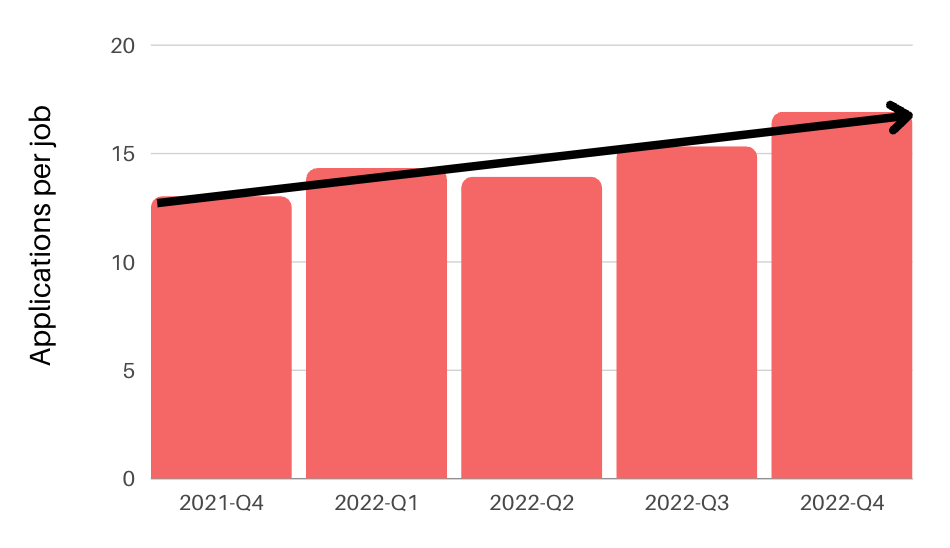2022 - 2023 Market Insights
It’s no secret that the world is moving at an incredible pace. From the global pandemic to the rising cost of living, we continue to see economic drivers impacting our industry and we’re here to keep you updated on the current trends in the market and how you can remain competitive at attracting and retaining top talent.
APPLICATIONS ARE UP, QUALITY IS DOWN
Average applications per job has increased by 28.4 % across Australia from Q4 2021 vs. Q4 2022.*

Whilst that stat may seem positive initially, unfortunately the quality of candidates suitable for the role is not as high and we may be seeing the impact of panic applying from the large number of redundancies that have been occurring across the market.
Our consultants are still filling over 50% of roles through our database, referrals, or head hunting. We are finding top quality candidates are not actively looking however many candidates are open to seeing what else is out there. In addition there is an increase in applicants coming from overseas since the borders re-opened - though again the quality is poor.
For those top quality candidates that are looking, they’re spoilt for choice with options and it’s more important than ever to:
- Present your brand in the best light throughout the interview process
- Educate your hiring managers that the interview is a two-way street
- Think about why this candidate should choose to work for your company over another?
- Keep your interview process as short and streamlined as possible to avoid missing out on quality candidates to companies who can be more agile in their decision making. Keeping candidates ‘warm’ is not a strategy that can work in this candidate short market.
SALARIES VS. CULTURE & BENEFITS
The talent shortage has led to an increase in salaries which has made securing top talent even more challenging but did you know
2 out of 3 job seekers rate company culture more important than salary?* Being able to express your company culture beyond a surface level response can help candidates picture the workplace and give them a feeling of wanting to be a part of it.
Your company culture can also be supported by the type of benefits you offer and these perks are a significant factor in determining whether a candidate will accept a new role. Benefits and Perks which may have captured employee attention years ago (like in-house gyms and free breakfast) may not hold the same weight now as many are now looking for benefits that demonstrate the company’s empathy and commitment to employee wellbeing.
Candidates place the highest value on benefits that are relatively low-cost to employers.

According to Seek Industry Spotlights, specifically to Marketing & Communications candidates; work-life balance is their second-greatest priority (after salary). The culture of a workplace is also highly valued by marketing & communications candidates and is ranked number three on the list of key drivers of attractions.
We encourage you to think about what benefits you currently offer candidates and what they might be saying about your company culture and compare these to your competitors. Being competitive with your salary offering is important but how you communicate your culture and benefits holds equal weight.
WHERE TO NOW FOR FLEXIBLE WORKING?
We know that flexible working is still if not the most, important aspect of a new job to candidates - with Indeed reporting searches for jobs “not fully tied to work sites” continuing to command much higher shares than those where no flexibility is offered*.
Amongst our clients, we are seeing a hybrid model (3/2) being the most common structure and one that candidates seem the most attracted to. We predict more companies will start to set core office days in an attempt to boost a sense of community and boost co culture.
Across our talent pool we are hearing that work flexibility is the key and most common deciding factor when it comes to candidates picking roles. In situations where they have two offers and even when it comes to the applying process. Candidates will almost always prefer and prioritise roles that offer flexible working.
Whether you can or can’t offer remote working, employers can remain competitive in the market if they offer candidates ownership over their hours. Being creative and flexible in approach to this is of high value to candidates e.g. 5 day week across 4 days.
We hope these insights have been helpful. Get in touch with our
team if you want to chat more about the current market or if you're looking for agency or client-side talent we'd love to chat to you!










